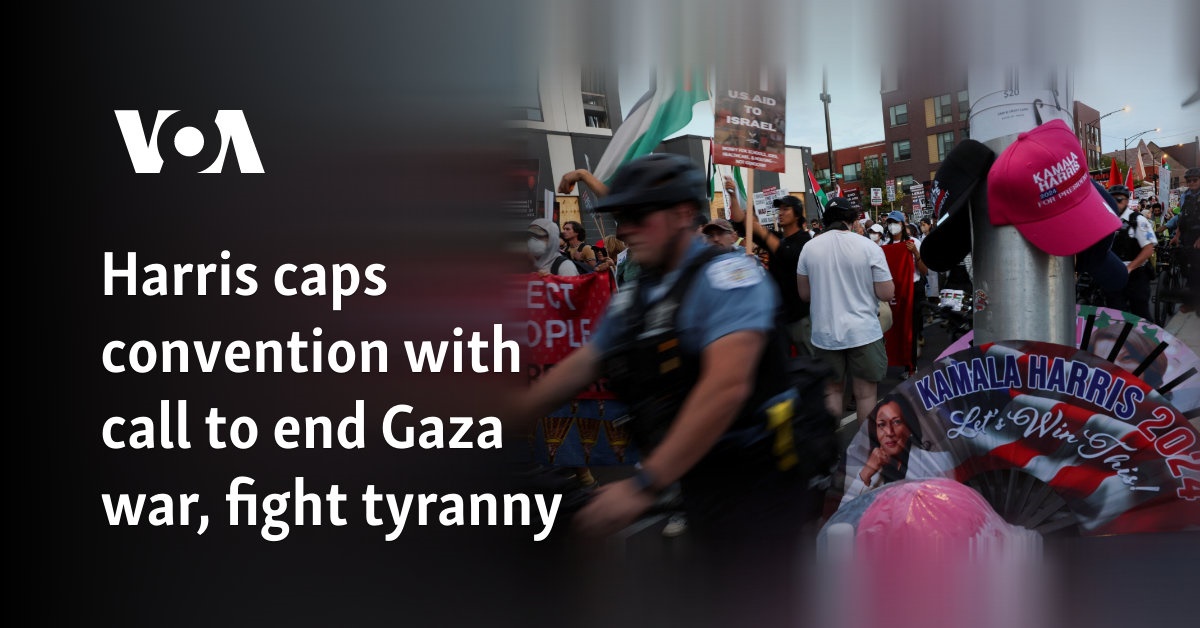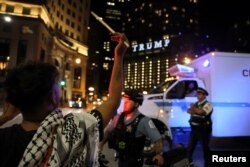Disappointed pro-Palestinian activists said Kamala Harris’ speech at the conclusion of the Democratic National Convention in Chicago failed to show a break with the status quo after the party’s most divisive issue was largely ignored last week.
Under pressure to respond to critics of U.S. support for Israel’s war in Gaza, the vice president used her speech Thursday night to reiterate earlier calls for a ceasefire and a deal to release the last hostages captured by Hamas on Oct. 7. She said she supported Israel’s right to self-defense, but also supported the Palestinian right to self-determination.
Abbas Alawieh, co-founder of the Uncommitted National Movement, which mobilized more than 750,000 voters to protest U.S.-Israel policy, said Harris missed an opportunity to win over those people, many of whom live in swing states such as Michigan, Wisconsin, Pennsylvania and Arizona.
“What is needed at this moment is bold leadership that breaks with the current approach,” Alawieh told Reuters shortly after Harris formally accepted the party’s nomination.
The Muslim delegates and their allies had been pushing for a prime-time speaking slot to discuss the latest bloodshed in the decades-old Israeli-Palestinian conflict, which began with the October 7 Hamas attack on Israel that killed some 1,200 people, according to Israeli sources.
Israel’s US-backed assault on the Hamas-ruled Gaza Strip has since killed more than 40,000 Palestinians, according to the territory’s Health Ministry, which does not distinguish between fighters and civilians in its count. Almost all of Gaza’s 2.3 million residents have been displaced, triggering a hunger crisis and razing almost the entire enclave to the ground.
A campaign spokesman declined to explain the decision not to have a Palestinian speaker speak at the DNC. The decision was made by DNC organizers in close consultation with the Harris campaign, sources familiar with the discussions said.
Party insiders fear that the Gaza war could cost Harris important votes in swing states like Michigan. Michigan has cities with a high proportion of Muslim and Arab Americans and university campuses where Gaza protests have already taken place.
The congress took place in Chicago, which, according to the Arab American Institute, is home to the largest Palestinian community in the United States.
The DNC has faced daily pro-Palestinian protests in Chicago, including thousands of demonstrators outside Harris’ speech on Thursday night, and dozens of arrests have been made throughout the week.
Protesters carried banners reading “No embargo, no vote” and “No ceasefire, no vote,” while thousands chanted “Ceasefire now” and “Long live Palestine.”
About a dozen delegates from the Uncommitted National Movement spent the night before on the sidewalk outside the convention to protest the DNC’s rejection of their request for a Palestinian speaker.
They welcomed the call for a ceasefire and the release of hostages by the parents of a US hostage held in Gaza – Rachel Goldberg and Jon Polin – on Wednesday evening, but said they should also have been given the opportunity to speak.
The United Auto Workers union and the Movement for Black Lives are among several groups and individuals who have expressed support for the protesters. Muslim Women for Harris-Walz said on X that they would cease their activities following the DNC’s decision.
“Last night, the DNC made clear that it values Palestinian lives and voices less than others. It is unconscionable to silence Palestinian voices while they face US-funded massacres, famines and ethnic cleansing,” said the Movement for Black Lives, a network of over 150 leaders and organizations.
Ruwa Romman, a Georgia state lawmaker and delegate who spent the night outside the DNC, said Uncommitted organizers had been negotiating with the Harris campaign for weeks and had submitted a list of possible speakers, but it had been rejected.
Shortly before Harris was about to give her speech, the unattached delegates re-entered the convention center on Thursday evening with their arms folded.
Before Harris’ remarks, Biden, Senators Bernie Sanders and Raphael Warnock, and Representative Alexandria Ocasio-Cortez made only occasional references to the war on the DNC stage.
A major donor to Harris’ campaign, who asked to remain anonymous so he could speak openly about his private conversations with the campaign, expressed concern that without a short-term ceasefire agreement and clear statements from Harris to end the war and protect civilians, there could be renewed protests on campus when classes resume at universities in the coming days.
“We need every vote,” said the donor.


